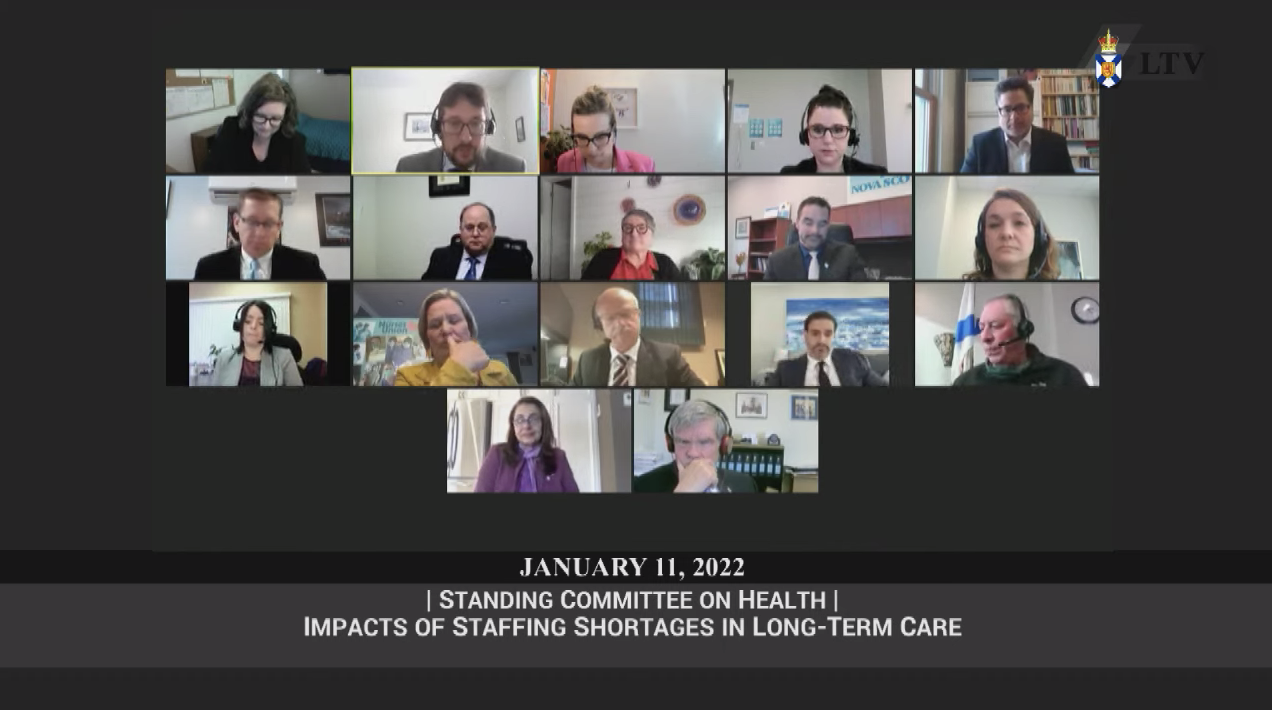Nurses union head Hazelton pleads for action on long-term care staff shortage
Union leaders propose more hours of care and higher wages to solve crisis

caption
Health committee chair Trevor Boudreau thanks CUPE regional president Nan McFadgen for her testimony. McFadgen had just said the province not raising wages of long-term care workers drives her “bananas.” The province's standing committee on health met on Tuesday.Union leaders pleaded for more government action in addressing long-term care staffing shortages at the legislature’s standing committee on health on Tuesday.
“We need action and we need it now,” said Nova Scotia Nurses Union president Janet Hazelton to the nine-member committee.
“We need to stop talking about fixing it and start doing the fixing.”
Katelyn Randell, the province’s director of long-term care, said 25 of the province’s nursing homes are closed to new admissions.
Hazelton says this is due to severe staffing shortages. “Long-term care workers are overworked, underpaid, and there just aren’t enough of them.”
“I hear from long-term care workers that when they ask a resident if anything is wrong, they pray the resident says no. Because they simply do not have the time to help everyone they’d like to, everyone they should,” said Hazelton.
The debate takes place as COVID-19 cases in the province surge. As of Tuesday, the province reported 6,796 active cases with 58 people in the hospital. The average age of those in hospital is 67.
“With COVID, there are shortages in every sector,” said Paul Lafleche, deputy minister for seniors in long-term care.
“But especially in health care and especially in long-term care we see these shortages. We need literally thousands of health care workers and over a thousand long-term care workers.”
At one point, Lafleche said, “we got hit with COVID and then we had staffing shortages.”
Hazelton took issue with that statement.
“We had staffing shortages in long-term care homes long before COVID. It’s frustrating that it took something as terrible as COVID for people to notice,” she said.
Hazelton and Canadian Union of Public Employees regional president Nan McFadgen had two solutions they wanted the committee to consider: more hours of care and higher wages.
Hours of care refers to how many hours a staff member spends with a patient or resident out of 24 hours. Data from The Nova Scotia Nurses Union shows the hours of care for long-term care homes is 3.57, a ratio that has not changed since 1989.
The union recommends the province set that ratio at 4.1 hours of care per patient. “If a facility has to guarantee an average of 4.1 hours of care per patient, the province would have to provide a budget that meets those needs,” said Hazelton in an interview with The Signal.
McFadgen insisted that this must come with a wage increase for long-term care workers. “It drives me bananas that the government won’t legislate 4.2 hours of care and increase their wages.”
“Long-term care workers could make more money if they went across the street and started waiting tables,” said Hazelton. “The only reason they don’t is they love their work and they care for our elderly.”
About the author
Adam Inniss
Adam Inniss is a Halifax-based writer from Guelph Ontario. He works as the News Editor for the Dalhousie Gazette and occasionally writes reviews...
